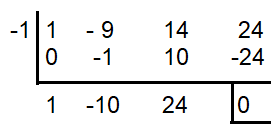SOLVE THE CUBIC EQUATION WITH GIVEN INFORMATION ABOUT ROOTS
Subscribe to our ▶️ YouTube channel 🔴 for the latest videos, updates, and tips.
Let the given cubic polynomial be
ax3 + bx2 + cx + d = 0
Let the roots be α, β and γ
Sum of the roots :
α + β + γ = -b/a
Sum of product of its two roots :
α β + βγ + γα = c/a
Product of roots :
α β γ = d/a
Problem 1 :
Solve the equation
3x3 - 16x2 + 23x - 6 =0
if the product of two roots is 1.
Solution :
Let the roots be α, β and γ
Sum of the roots = α + β + γ = -b/a
Here a = 3, b = -16, c = 23 and d = -6
α + β + γ = -(-16)/3
α + β + γ = 16/3 ----(1)
Product of the roots = α β γ
α β γ = -d/a
1(γ) = 6/3
γ = 2
α β = 1
β = 1/α
Applying the value of β and γ = 2 in (1), we get
α + 1/α + 2 = 16/3
(α2 + 1)/α = (16/3) - 2
(α2 + 1)/α = 10/3
3(α2 + 1) = 10α
3α2 + 3 = 10α
3α2 - 10α + 3 = 0
(3α - 1) (α - 3) = 0
|
α = 1/3 β = 1/α β = 1/(1/3) β = 3 |
α = 3 β = 1/α β = 1/3 |
The roots are 1/3, 3 and -2 (or) 3, 1/3, -2
Problem 2 :
Find the sum of the square of roots of the equation
2x4 - 8x3 + 6x2 - 3 = 0
Solution :
By comparing the given cubic equation with
ax3 + bx2 + cx + d = 0
a = 2, b = -8, c = 6 ad d = -3
Sum of the roots = α + β + γ = -b/a
α + β + γ = 8/2 ==> 4
Sum of product of its two roots :
α β + βγ + γα = c/a
α β + βγ + γα = 3
α2 + β2 + γ2 = (α + β + γ)2 - 2(α β + βγ + γα)
α2 + β2 + γ2 = (4)2 - 2(3)
= 16 - 6
α2 + β2 + γ2 = 10
Problem 3 :
Solve the equation
x3 - 9x2 + 14x + 24 = 0
if it is given that two of its roots are in the ratio 3 : 2.
Solution :
Let the roots be α, β and γ

x = -1 is one of the solution, the remaining two solutions can be found by solving the quadratic equation.
x2 - 10x + 24 = 0
(x - 4)(x - 6) = 0
x = 4 and x = 6
So, the solutions are -1, 4 and 6.
Note :
Here the roots 6 and 4 is in the ratio 3 : 2.
Problem 4 :
If α, β and γ are the roots of the polynomial equation
ax3 + bx2 + cx + d = 0
find the value of Σα/βγ in terms of the coefficients.
Solution :
Problem 5 :
If α, β, γ and δ are the roots of the polynomial equation
2x4 + 5x3 - 7x2 + 8 = 0
find a quadratic equation with integer coefficients whose roots are α + β + γ + δ and α β γ δ.
Solution :
2x4 + 5x3 - 7x2 + 8 = 0
Comparing the given polynomial of highest exponent 4 with
ax4 + bx3 + cx2 + dx + e = 0
a = 2, b = 5, c = -7, d = 0 and e = 8
and roots of the above polynomial are α, β, γ and δ.
Sum of roots (α + β + γ + δ) = -b/a
(α + β + γ + δ) = -5/2
Product of roots α β γ δ = e/a
α β γ δ = 8/2 ==> 4
Sum of roots of new equation :
(α + β + γ + δ) + α β γ δ = (-5/2) + 4
= 3/2
Product of roots of new equation :
(α + β + γ + δ) x α β γ δ = (-5/2) x 4
= -10
The new equation will be
x2 - (3/2)x + (-10) = 0
2x2 - 3x - 20 = 0
Subscribe to our ▶️ YouTube channel 🔴 for the latest videos, updates, and tips.
Recent Articles
-
Finding Range of Values Inequality Problems
May 21, 24 08:51 PM
Finding Range of Values Inequality Problems -
Solving Two Step Inequality Word Problems
May 21, 24 08:51 AM
Solving Two Step Inequality Word Problems -
Exponential Function Context and Data Modeling
May 20, 24 10:45 PM
Exponential Function Context and Data Modeling